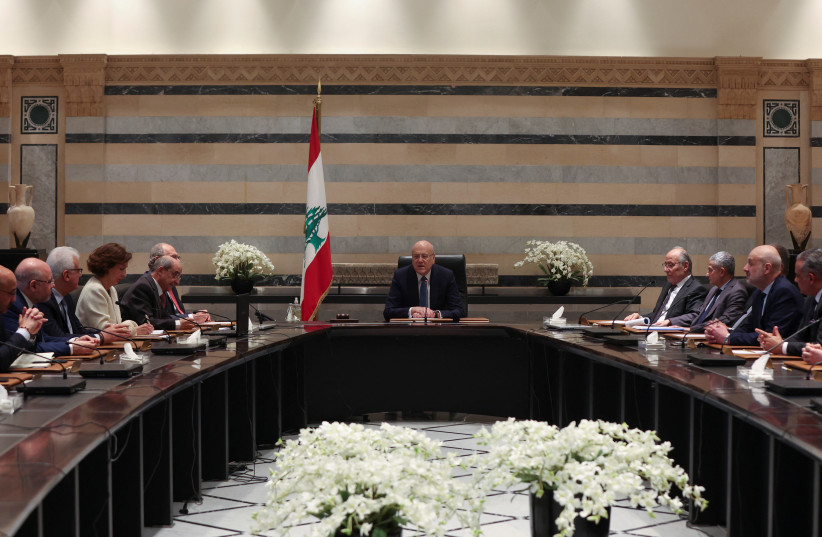The Lebanese cabinet warned Monday that if the UN does not pay its electricity bill, it will cut service to Syrian refugee camps.
For more stories from The Media Line go to themedialine.org
Lebanon has dealt with electricity problems since the beginning of the country's civil war in the 1970s. However, ever since the current economic meltdown, which started in 2019, the situation has gotten much worse.
According to the UN, Lebanon hosts more refugees per capita than any other country. The Lebanese government estimates that in addition to its 7 million citizens, the country hosts roughly 1.5 million Syrian refugees, nearly half a million Palestinian refugees, and a few thousand refugees from other countries. Most of this population resides in refugee camps.
Lebanon sought UN aid in securing energy
In June this year, Lebanon asked the UN to help pay for the electricity Syrian and Palestinian refugees used. However, it did not publicly specify the amount it was seeking. The government urged the Lebanese Electricity Company to intensify its communications with the UN High Commissioner for Refugees.
Beirut-based scholar Lorenzo Trombetta, who consults for the UN and international NGOs, told The Media Line that the Lebanese Electricity Company supplies Lebanese homes with electricity for only a few hours daily. He said the situation in the country's refugee camps is much worse.

The distribution of electricity, Trombetta said, "is increasingly entrusted to a plethora of businessmen, linked to the political elite in government for about 30 years and who share the cake of the lucrative management of private electric generators.” These generators are “highly polluting.”
The Lebanese Electricity Company controls 90% of the country's electricity production. However, according to a report published by Human Rights Watch in March, the company provides citizens with only one to three hours a day of electricity, leaving privately provided power as the only alternative for the rest of the day.
Trombetta said these private electricity transactions are denominated in US dollars, contributing to the “dollarisation” of the Lebanese economy and exacerbating the country's economic woes.
Tamirace Fakhoury, an associate professor at Aalborg University in Copenhagen, said that the government's threat to cut electricity to refugees should be seen from a broader perspective.
Since the onset of the Syrian refugee crisis, she said, "Lebanon has been lobbying the international community for more aid and blasting” global inequities in refugee burden-sharing.
Lebanese politicians are concerned, she said, that the Ukraine war has diverted aid from Syrian refugees and pushed Lebanon’s refugee predicament off the global agenda.
Some politicians blame Syrian refugees for many of Lebanon’s ills, including the economic crisis.
"Scapegoating refugees, putting them at the forefront of Lebanon’s financial meltdown, and threatening to deprive them of livelihoods and protection is a political strategy,” Fakhoury argued.
In 2018, the Lebanese government launched a campaign to reduce the number of Syrian refugees in the country. That effort was halted due to COVID-19 but resumed in late 2022.
The Lebanese army has engaged in some refugee deportation. In other cases, Syrian refugees have been obliged to leave because of the country's socioeconomic crisis and discrimination by members of the Lebanese public and government. However, the conditions for return are not good, as Syria is still in difficult shape.
Fakhoury argues that the Lebanese government is using the electricity issue to seek more international funding. "Such acts of contestation, discursive threats, and warnings to the international community are to be read in a longer-term strategy aimed at making refugees’ lives untenable while signaling to the international community that Lebanon needs more funding," she said.
Fakhoury said that the demand for electricity money should be viewed in a broader context. Since Syrian refugees arrived, the Lebanese government has been lobbying the international community for more aid, saying that existing levels of refugee support are not mitigating the strain on Lebanon’s economy and infrastructure.
A Lebanon-based humanitarian worker told The Media Line that political leaders are using the refugees to explain the country’s severe electricity shortage.
She said the “weak capacity of the state and the electricity situation in Syrian and Palestinian refugee camps contribute to fueling anti-refugee sentiment” in Lebanon. “The refugee crisis” is being used to “justify the failing energy sector in Lebanon."
Trombetta says that the Lebanese government's announcement on Monday is part of an effort to reinforce a "Lebanese first" message by demonstrating hostility towards refugees.
Lebanon’s demand for UN electricity payments is also an attempt to force the international body to spend more US dollars on increasingly expensive fuel bills for the electric generators operating in refugee camps.
UN financial support for private fuel supplies would benefit managers of private electricity generators and fuel importers.
